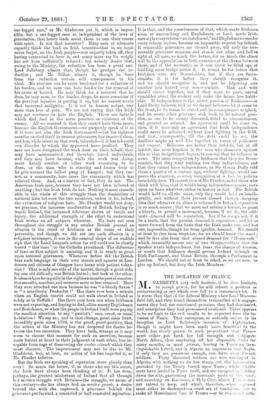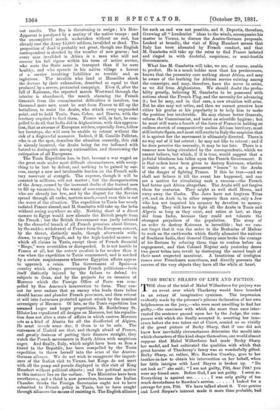THE ISOLATION OF FRANCE
MGAMBETTA may well hesitate, if he does hesitate, • to accept power, for he will inherit a position as embarrassing as any which ever fell to a statesman's lot. It is worse than that of the Liberal Ministry when Lord Beacons- field fell, and they found themselves trammelled with engage- ments they had not sanctioned, promises they had denounced, and enterprises they had pronounced irrational. There appears to be no limit to the evil results to be expected from the in- vasion of Tunis. That enterprise, as radically unjust in its inception as Lord Salisbury's invasion of Afghanistan, though it might have been made more beneficial to the world, has slowly grown to such proportions that France must either put forth her full strength and sebjugate North Africa, thus employing all her disposable force for many months, or must retreat, leaving in Tunis an inex, tinguishable hatred, and in Algeria an impression that Arabs, if only they are persistent enough, can drive away French soldiers. Forty thousand soldiers are now encamped in Algeria, with nothing to do but stamp out the insurrection provoked by the Treaty forced upon Tunis ; while ;;5,000 more have landed in Tunis itself, and are occupied in holding down the city, garrisoning the miserable ports of the .!oast., and marching on Kairouan, a Holy City, which Ffan .e does not intend to keep, and which, therefore, when e.:ptured must either be destroyed—a cruel act of vandalism, earc to make all Massulmans foes of France —or be evaceae-1 with-
out results. The Bey is threatening to resign ; la's Heir- Apparent is paralysed by a mutiny of the native troops ; and the uncompleted march, undertaken without an end, has already cost the Army 15,000 soldiers, invalided or dead. The proportion of dead is probably not great, though one English correspondent is shocked by the number of new graves ; but every man invalided in Africa is a man who will not recover his full vigour within his term of active service, who costs the State more in transport than if he were healthy, and who spreads in his native village a horror of a service involving liabilities so terrible and so inglorious. The invalids who land at Marseilles shock the doctors by their exhaustion, described as equal to that produced by a severe, protracted campaign. Even if, after the fall of Kairouan, the reported march Westward through the interior is abandoned, the march alarming the French Generals from the commissariat difficulties it involves, ten thousand more men must be sent from France to fill up the battalions, to resist the Arabs, who attack every unguarded point, and to hold Tunis, Susa, Cabes, and Biserta, with the territory required to feed them. France will, in fact, be com- pelled to do all that India did in Afghanistan, with this aggrava- tion, that as swarms of European settlers, especially Jews, follow her footsteps, she will soon be unable to retreat without the risk of a disgraceful massacre. Indeed, if M. Camille Pelletan, who is on the spot, describes the situation correctly, this risk is already incurred, the Arabs being far too inflamed with hatred to distinguish among nationalities, and threatening the extirpation of all Europeans. The Tunis Expedition has, in fact, become a war waged on the great scale under most difficult circumstances, with every- thing to be lost by defeat, and nothing to be gained by suc- cess, except a new and intolerable burden on the French mili- tary reservoir of strength. The expense, though it will be counted in millions, will not matter ; but the disorganisation of the Army, caused by the incessant drafts of the trained men to fill up vacancies, by the waste of non-commissioned officers, who are already too few, and by the disgust for the Service spread through all ranks, matters much,—and even this is not the worst of the situation. The expedition to Tunis has nearly isolated France abroad, and M. Gambetta will take up the helm without seeing anywhere an ally. Nothing short of a direct menace to Egypt would now alienate the British people from the French ; but the British Government was justly irritated by the shameful breach of all French promises about Greece, by the sudden withdrawal of France from the European concert, by the threat, distinctly made, though afterwards with- drawn, to occupy Tripoli, and by the high-handed manner in which all claims in Tunis, except those of French financial Rings," were overridden or disregarded. It is not hostile to France at all, but the entente cordiale is far weaker than it was when the expedition to Tunis commenced, and is marked by a certain suspiciousness whenever Egyptian affairs appear to approach a crisis. The Government of Spain—a eountry which always preoccupies French politicians—feels itself distinctly injured by the failure to defend its subjects in Oran, and by the projects for an invasion of Morocco which the Foreign Office of Paris was com- pelled by Bou Amema's insurrection to form. They can- trot for ever endure that an enemy who leads three tribes should harass and plunder French provinces, and then retreat at will into fastnesses protected against attack by the nominal sovereignty of Morocco. Of late, as the Tunis expedition has assumed larger and larger proportions, M. Barthelemy St. Hilaire has repudiated all designs on Morocco, but his repudia- tion does not alter a state of affairs in which eastern Morocco acts as a kind of Alsatia for all the disaffected of Algiers. He must invade some day, if Oran is to be safe. The statesmen of Madrid see that, and though afraid of France, and greatly desirous of putting their finances straight, they watch the French movements in North Africa with suspicious anger. And finally, Italy, which might have been so firm a friend to the Republic, has been compelled by the Tunis expedition to throw herself into the arms of the Austro- German alliance. We do not wish to exaggerate the import- ance of the Italian visit to Vienna, but Kings do not meet with all the pomp and parade displayed in this visit of King Humbert without political objects ; and the political motive in this instance lies on the surface. Two Ministries have been overthrown, and a third is now powerless, because the Italian Chamber thinks the Foreign Secretaries ought not to have submitted to French policy in Tunis, but to have sought through alliances the means of resisting it. The English alliance for such an end was not possible, and S. Depretis, therefore, throwing all " Irredentist " ideas to the winds, accompanies his master to Vienna, to discuss the Austro-German proposals. Looked at broadly, the visit of King Humbert means that Italy has been alienated by French conduct, and that M. Gambetta will take up the reins to find France isolated and ringed in with doubtful, suspicious, or semi-hostile Governments.
What line M. Gambetta will take, we are, of course, unable to predict. He is a much bolder man than his predecessors, knows that the peasantry care nothing about Africa, and may be aware of the loathing for African service existing among the conscripts, and may, therefore, have the nerve to retire, as we did from Afghanistan. We should doubt the proba- bility greatly, believing M. Gambetta to be possessed with notions about the French Flag, and the necessity for advancing it ; but he may, and in that case, a new situation will arise. But he also may not retire, and then we cannot perceive how either his genius or his popularity is to help him to make the position less intolerable. He may choose better Generals, reform the Commissariat, and insist on scientific hygiene; but he must still waste a fourth of the force of France in holding an endless stretch of comparatively useless African territory, must still irritate Spain, and must still excite in Italy the suspicion that it is against her the movement is ultimately directed. There is no way out of it but retreat ; he may not like to retreat ; and if he does perceive the necessity, it may be too late. There is a rumour now being circulated by the correspondents, which we cannot believe, but which, if it is true, would suggest that a judicial blindness has fallen upon the French Government. It is that orders have been given to destroy Kairouan, whether it resists or not, as a permanent " lesson " to the Arabs of the danger of fighting France. If this be true—and we shall not believe it till the event has happened, and can see a motive for circulating such a rumour—the French had better quit Africa altogether. The Arabs will not forgive them for centuries. They might as well shell Mecca, and carry away the Caaba. The Jews have not forgiven Titus yet, and an Arab is, in other respects than race, only a Jew who has not impaired his memory by devotion to money- making. They will have to fight all the Arabs in Tunis and Algeria as long as they exist, and retire at last, as they did from India, because they could not tolerate the strongest prejudices of the population. The story of an order to destroy Kairouan . is incredible ; but we can- not forget that it was the order to the Brahmins of Madras to work on the earthworks which finally alienated the natives of Southern India, that General Chanzy once broke the courage of his Bretons by refusing them time to confess before an engagement, and that Colonel Negrier only yesterday drove two great tribes into revolt by destroying the sacred tomb of their most respected marabout. A fanaticism of irreligion comes over Frenchmen sometimes, and directly prevents the success of the very objects they have all the while at heart.



































 Previous page
Previous page